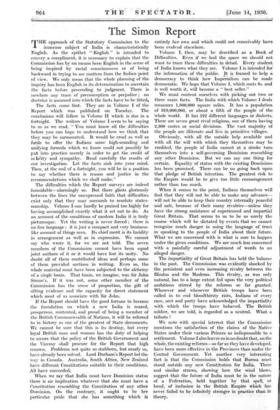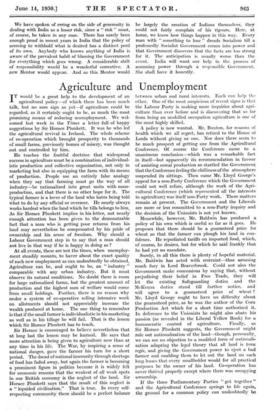The Simon Report
THE approach of the Statutory Commission to the immense subject of India is characteristically English. As the epithet "'English " is intended to convey a compliment, it is necessary to explain that the Commission has by no means been English in the sense of being inspired by racial consciousness or of being backward in trying to see matters from the Indian point of view. We only mean that the whole planning of the inquiry has been English in its determination to ascertain the facts before proceeding to judgment. There is nowhere any trace of preconception or prejudice ; no doctrine is assumed into which the facts have to be fitted.
The facts come first. They are in Volume I of the Report which was published on Tuesday. The conclusions will follow in Volume II which is due in a fortnight. The writers of Volume I seem to be saying to us as we read, " You must know all the difficulties before you can hope to understand how we think that they may be surmounted. It would be cruel as well as futile to offer the Indians some high-sounding and unifying formula- which we know could not possibly be put into practice merely in order to get the credit of ncbility and sympathy. Read carefully the results of our investigation. Let the facts sink into your mind. Then, at the end of a fortnight, you will be in a position to say whether there is reason and justice in the recommendations which we shall make."
The difficulties which the Report surveys are indeed formidable—alarmingly so. But there glints gloriously between the lines the unexpressed faith that difficulties exist only that they may succumb to resolute states- manship. Volume I can hardly be praised too highly for having accomplished exactly what it set out to do. As an account of the conditions of modern India it is truly picturesque. Yet the writing is never forced ; there is no fine language ; it is just a compact and very business- like account of things seen. Its chief merit is its lucidity in arrangement as well as in expreSsion. We cannot say who wrote it, for we are not told. The seven members of the Commission cannot have been equal joint authors of it or it would have lost its unity. No doubt all of them contributed ideas and perhaps some of them provided sections in writing. Even so, the whole material must have been subjected to the alchemy of a single brain. That brain, we imagine, was Sir John Simon's. If it was not, some other member of the Commission has the sense of proportion, the gift of sifting evidence and the capacity for direct statement which most of us associate with Sir John.
If the Report should have the good fortune to become the foundation on which a new India is reared, prosperous, contented, and proud of being a member of the British Commonwealth of Nations, it will be referred to in history as one of the greatest of State documents. We cannot be sure that this is its destiny, but every loyal British man and woman has the duty of helping to secure "that the policy of the British Government and the Viceroy shall procure for the Report that high renown. Problems not quite so stubborn, but nearly so, have already been solved. Lord Durham's Report led the way in Canada. Australia, South Africa, New Zealand have different Constitutions suitable to their conditions. All have succeeded.
When we say that India must have Dominion status there is no implication whatever that she must have a Constitution resembling the Constitution of any other Dominion. On the contrary, it ought to be her particular pride that she has something which is entirely her own and which could not conceivably have been evolved elsewhere.
Volume I, then, may be described as a Book of Difficulties. Even if we had the space we should not want to trace these difficulties in detail. Every student of India knows what they are. Volume I is intended for the information of the public. .It is framed to help democracy to think how Imperialism can be made democratic. We hope that Volume I, which costs 3s. and is well worth it, will become a " best seller."
We must content ourselves with picking out two or three main facts. The India with which Volume I deals measures 1,800,000 square miles. It has a population of 319,000,000, or about a fifth of the people of the whole world. It has 222 different languages or dialects.
There are seven great rival religions, one of them having 2,300 castes or social divisions. The vast majority of the people are illiterate and live in primitive villages.
Obviously, with all the outside help available and with all the will with which they themselves may be credited, the people of India cannot at a stroke turn themselves into a self-governing Dominion resembling any other Dominion. But we can say one thing for certain. Equality of status with the existing Dominions has been promised. There can be no going back upon that pledge of British intention. The greatest risk to the Empire would be to give too little encouragement rather than too much.
When it comes to the point, Indians themselves will find that they will not be able to make any advance— will not be able to keep their country internally peaceful and safe, because of their many rivalries—unless they have the strong assistance of experienced and impartial Great Britain. That seems to us to be so surely the course which will be dictated by events that we cannot recognize much danger in using the language of trust in speaking to the people of India about their future. What we are concerned with is what is sure to happen under the given conditions. We are much less concerned with a painfully careful adjustment of words to an alleged danger.
The impartiality of Great Britain has held the balance in the past. The Commission was evidently shocked by the persistent and even increasing rivalry between the Hindus and the Moslems. This rivalry, as was only natural, has to a large extent fed upon the very political ambitions stirred by the reforms so far granted.
Wherever and whenever British troops have been called in to end bloodthirsty riots, Indians of every race, sect and party have acknowledged the impartiality . with which the troops have behaved. The British soldier, we are told, is regarded as a neutral. What a tribute !
We note with special interest that the Commission mentions the satisfaction of the claims of the Native States under their various Princes as indispensable to a settlement. Volume I also leaves us in no doubt that, on the whole, the existing reforms—so far as they heve-deVelOped, have been more effective in the Provinces than Under the Central Government. Vet another very interesting fact is that the Commission holds that Burma must stand outside any new Constitution for India. These and similar straws, showing how the wind blows, suggest that the future of India must be in the nature of a Federation, held together by that spell, or bond, of inclusion' in the British Empire which has never failed to be infinitely stronger in practice than in theory. We have spoken of erring on the side of generosity in dealing with India as a lesser risk, since a " risk " must, of course, be taken in any case. • There has surely been enough proof in recent years in India that the policy of seeming to withhold what is desired has a distinct peril of its own. Anybody who knows anything of India is aware of the prevalent habit of blaming the Government for everything which goes wrong. A considerable shift of responsibility would be a wonderful corrective. A new Mentor would appear. And as this Mentor would be largely the creation of Indians themselves, they could not fairly complain of his rigours. Here, at home, we know how things happen in this way. Every man with " something to lose " dreads Socialism till a professedly Socialist Government comes into power and that Government discovers that the facts are too strong for it. The anticipation is usually worse than the event. India will want our help in the process of assuming power through a responsible Government. She shall have it honestly.



































 Previous page
Previous page